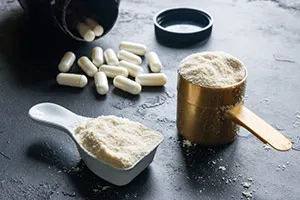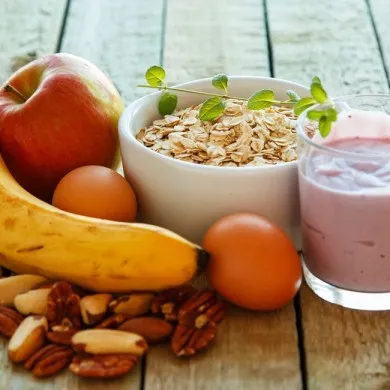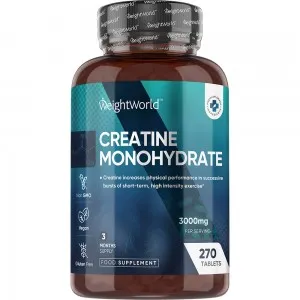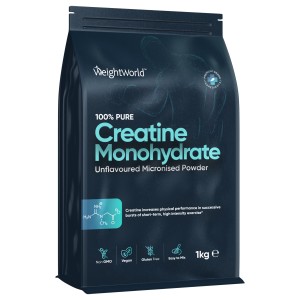What Is Creatine?
Creatine is a naturally occurring molecule that is produced in the body of animals (including humans). It is an essential ingredient in how your body produces energy in maximal exercise, whilst also possessing elements that aid with fatigue. The most popular form in which you would find Creatine as a supplement, is Creatine Monohydrate, which is considered widely to be the cheapest and most effective form of the molecule. A high Creatine concentration can be found in meat, eggs and fish, but comparatively the most potent form in which you will find Creatine, is in that of a supplement.
How Does Creatine Work?

Creatine in short, works to give you that added boost to fulfil your fitness goals! When ingested into the body, it is broken down to form Phosphocreatine, which is an invaluable molecule for producing power in exercise. When you are running a 100m sprint, lifting a very heavy weight, or trying to jump a long distance in a single bound, your body switches the way it creates its energy. Your body would usually rely on glucose, which would be broken down to form ATP (the natural molecules of precious energy). But the process that creates ATP from glucose, oxidative or glycolytic oxidative respiration, is far too slow to count on in these split second superhuman acts of power. Instead your body reverts to the Phosphocreatine system, which as you may have guessed, relies on Creatine. In this process, molecules of Phosphocreatine, ADP and Hydrogen combine together and create ATP energy, which is immediately used for exercise. This vital system is the fastest way you can get energy released into your muscles, and is what gives you that bitter kick that pushes you that inch further than you have ever gone before.
Creatine in the muscles is also used in another way too! It can help to relieve you of pain from exercise due to another amazing reaction it is the central part of. The reason why your muscles burn and sting after tough exercise is due to the buildup of lactic acid as a by product of creating the energy for exercise and physical activity. What makes this lactic acid burn and hurt is the concentration of hydrogen ions inside it. Creatine is involved in a helpful reaction called the Creatine Kinase reaction. This is when used Creatine from the Phosphocreatine system rejoins with ADP, and also uses Hydrogen molecules in the process, to create ATP. By using up the Hydrogen molecules in the reaction, they stop them from making the muscle acidic.
Why Do You Need a Creatine Supplement When It's Produced Naturally?
For the same reason that most athletes take it. Because relatively speaking, beyond hard training, practice and a good diet, Creatine is arguably the most effective way in which to improve your muscular performance. This goes for both ability to exhibit strength and the ability of your skeletal muscle to withstand fatigue. Supplementation with Creatine leaves your body with a higher concentration of it with which to carry out the Phosphocreatine and Creatine Kinase reactions to a greater and longer extent. It is important also to consider that though Creatine exists naturally in the body, this naturally occurring supply comes in a limited amount. Furthermore, even the natural sources of Creatine, namely turkey and red meat have a limited amount of Creatine in them too, and this necessitates the supplementation of Creatine. Think of Creatine in the muscles like petrol in a car, the more you put in...the longer you can drive for.
Benefits Of Taking A Creatine Supplement

Increased Maximal Muscle Performance - By supplying the body with excess amounts of Creatine, you are providing it with a greater tool with which to carry out the Phosphocreatine system to provide ATP energy.
Increased Muscle Endurance - A greater quantity of Creatine in the body leads to a greater supply for the Creatine Kinase reaction, which shuttles Hydrogen ions out of the muscle. This relieves lactic acid buildup and therefore allows for prolonged high-intensity exercise.
Muscle Building Capabilities - Maximal exercise is the most effective way of both increasing strength and maintaining maximal exercise for longer. These brief moments of intense output serve to tear, build and tone muscle mass and increase your strength. The presence of Creatine can help you get the most out of these moments.
Is Creatine Safe & What Precautions Should I Take?
Relatively speaking, given the potency of Creatine, it is very safe to take the supplement. However, there are two drawbacks. Firstly, the effects of Creatine can be diluted by the consumption of caffeine. Secondly, and most important is the fact that Creatine when active in the muscles, draws water into the muscle cells. This, in turn, leaves less water to circulate and maintain hydration, this leaves you more susceptible to dehydration, which is dangerous if it is unchecked, but is especially so during exercise.
For the above reasons, it is therefore very important that you consume a considerably larger quantity of fluids whilst undertaking a routine of Creatine supplementation. It is important to note that failure to adjust water levels accordingly, can result in stomach cramps and diarrhoea.
What Time Should You Take Creatine?

Creatine luckily isn't as complicated to use as part of a routine as other supplements, you won't have to worry about forgetting your shaker as you hurriedly try and get your protein intake immediately after exercising for example. You should take Creatine simply as part of the diet so alongside meals will do just fine. However, in order to get the best out of Creatine, you have to load it. This means you have to consume an elevated amount of it for roughly a week-long period, before then consuming regular servings thereafter. This loading process allows your body to biologically adjust to the elevated amount in the body that you are aiming to work with, and will ensure that your body doesn’t expel a lot of it as urine, as it very well could if you were to start on a lower serving.









